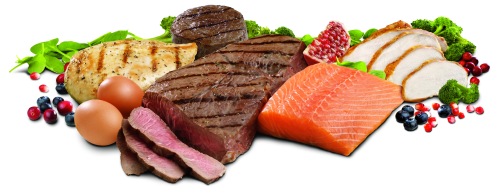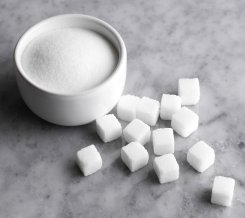
1.Choose a diet that is as close to natural as possible.
The more processing that foods go through before they are eaten, the less nutritient value they have and the more added non-nutrient substances that have been added to them. For example, eat fruit and stay away from fruit juice drinks. Eat fresh vegetables and stay away from frozen vegetable servings with cheese or other sauces. Usually, foods in their natural state are cheaper and by far more nutritious than their refined cousins.

- Choose good fats over bad fats
The worst fats for you to eat are partially hydrogenated fats. You will find these included in most processed foods. These are related to all sorts of health problems. Limit your intake of fried foods as the constant heat will change a good oil into a health hazard. Next, limit your intake of animal fats, saturated fats, and increase your intake of good omega 3 and omega 6 oils. An example of an omega 6 oil is olive oil. Make sure that it is extra virgin and green in color. The omega 3 oils are the nut and seed oils or deep water fish oils. Of course, you may choose to take capsules of these good oils, but don’t do that if it is just an excuse to let you eat more animal or trans fats.
- Variety is the spice of life
Eat a wide variety of foods each day. The most commonly missed foods in a diet are fiber foods, fruits, vegetables and dairy products. Plan your day so that you get at least two of each of these types of food per day.

- Water – the other essential nutrient
Our bodies work on water. It fills our blood vessels, our kidneys need it flush out waste products, our skin uses it to help control our body temperature and the list goes on. We have a thirst center for water, not for coffee or juice or beer – just water. When you are thirsty, drink plain water until your thirst is gone. Then if you choose, drink what you want for enjoyment but avoid sugared drinks or those with artificial sweeteners. Drinking tap water can contain other chemicals so if you want to start with good water get Reverse Osmosis water from the grocery for water refill. Only do Reverse Osmosis water purely for 2-3 months then start putting a tiny amount of tap in it to change the concentration of Reverse Osmosis water. It will be too strong of a concentration of water to continue in long term and will drain out important minerals, vitamins, proteins in your body.

- Vegetables – the source of most vitamins
Don’t skip on your vegetables. They are excellent sources of vitamins, minerals (except calcium and magnesium) and fiber. Don’t be fooled into thinking that a salad of iceberg lettuce provides you with anything. It is one of the most useless foods ever grown. Choose any other leafy vegetable or lettuce for you salad and don’t use a bottled dressing. In general, try to eat one vegetable from below the ground to every four to five from above the ground.

- Fruit – hidden gems
Fruit is relatively high in carbohydrates so limit your consumption but don’t overlook these great sources of energy and nutrients. These colorful components of our diets are high in special nutrients like carotinoids, lycopene, flavinoids, rutin and other substances that help prolong our health and vitality. First, eat the fruit that is in season. Second, wash the skin of the fruit thoroughly and if it is edible, eat the skin with the fruit. Third, if possible eat one piece of citrus fruit for every two servings of other kinds of fruit.

- Don’t over eat or under eat your protein
A good rule of thumb is to make sure you eat two to three small servings of protein a day. Small means small, not the size usually given in a restaurant. Make an attempt to eat more fish. Fish is easily digested and deep-water fish like salmon, not farm raised, is high in the good omega 3 oils. Eggs are one of the best protein sources but as with all things don’t over do it.


- Sugar and salt have no redeeming value besides taste
Use sugar and salt sparingly, a little goes a long way. Don’t even think of using artificial sweeteners, their side effects can be worse than sugar and they don’t reduce your taste for sugar. Honey, maple syrup, brown sugar and etc. are almost as bad. Salt causes water retention and mineral balance problems. Instead of salt on meat, try a little lemon juice. This Italian trick enhances the taste of the meat without salt.
- Walk the perimeter of your grocery store
Think about where the healthy foods are in the typical grocery store. They are all on the outside. Shop there. About all that you need on the inner isles are cleaning agents and toilet paper. When you are on these isles of prepared foods, read the labels. Look for the quantities of fats, calories and ingredients that you can’t pronounce. Remember that the list of ingredients is in the quantity. If water or sugar is listed first, then that is the most plentiful of all of the ingredients. Glucose, sucrose, maltose, galactose, lactose and corn sweetener are all of the names for different types of sugars. By using more than one of these, a company can try and trick you into thinking the product has less sugar than it does. Pay attention to the number of servings in a package. To make a candy bar seem not as bad as it is, the company will say that the package contains two servings. When was the last time someone shared a small candy bar or saved half of it for another day? If you can’t understand the ingredient, most likely it is artificial sweetener or food preservative. This makes most of the food are not whole food.

- Don’t forget your calcium
Dairy products are one of the few great sources for calcium. Aging effects bone density and calcium is a critical component. Most of the societies where people live long healthy lives are cheese or yogurt eaters. As in all cases, moderation is the key.
- Take your supplements
It is impossible to create a diet that you will eat all year and fill all of your nutrient needs. It sounds ideal and it is. Our soil is depleted in some nutrients. In the winter, our vegetables and fruits come from South America. Food preparation destroys some of the nutrients. Set a good supplement program for your specific needs and think of it as an insurance policy. If you have any questions regarding which supplement company has good quality, stay tuned for a future blog topic!
Remember, a diet to support a long and healthy life is not like a religion. It doesn’t have any Do Not’s – just a lot of reductions and increases.
